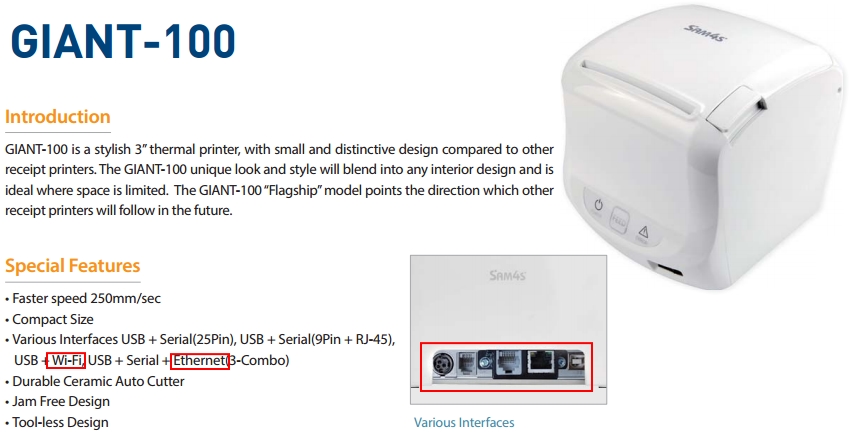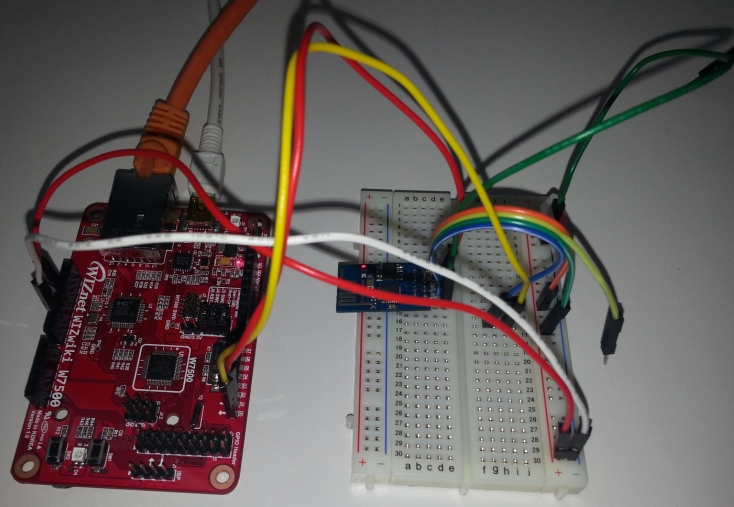..
Dependencies: ESP8266Interface WIZnetInterface_namespace mbed-src
Dual Network Interface
Some our customers want dual network interface like below.

So, I decided to implement dual network interface with ESP8266(WiFi) and WIZwiki-W7500(Ethernet).
Implementation
But, I had some troubles because of the below.
- There is no abstract class for all network interface
- Same header file name in two library WIZnetInterface(EthernetInterface) and ESP8266Interface
- Same class name in two library WIZnetInterface and ESP8266Interface
If I can modify Makefile, there will be better way to solve this problem. But, I couldn't modify Makefile in mbed.
So I solved this problem using namespace. Of course, there may be another way to change all class name and file name in the library. But, I wanted to minimize the changes of original library.
First, I changed the header file name in WIZnetInterface from <*.h> to <*.hpp>.
Declaration namespace in header file
// Endpoint.hpp
namespace wiznet_space {
class Endpoint {
friend class UDPSocket;
....................
}
}
// Socket.hpp
namespace wiznet_space {
class Socket {
public:
Socket();
..........................
}
}
..........................
..........................
Using namespace in source file
// main.c
..........................
ESP8266Interface wifi(D1, D0, D2, "WizFiDemoAP","12345678",115200); // tx, rx for
wiznet_space::EthernetInterface eth;
bool InitializeWiznetEthernet()
{
uint8_t mac_addr[6] = {0x00, 0x08, 0xDC, 0xFF, 0x11, 0x22};
eth.init(mac_addr, "192.168.3.102", "255.255.255.0", "192.168.3.1"); //Use DHCP
.......................................................................................................................
}
bool InitializeESP8266()
{
wifi.init();
.......................................................................................................................
}
int main()
{
....................................................................
// Ethernet : WIZnet hardwired TCP/IP in W7500
if ( InitializeWiznetEthernet() )
{
// Send TCP/IP data via Ethernet
ProcessDataViaEthernet();
}
// WiFi : ESP8266
if ( InitializeESP8266() )
{
// Send TCP/IP data via WiFi
ProcessDataViaWiFi();
}
....................................................................
}
// ProcessDataViaEthernet.cpp
void ProcessDataViaEthernet()
{
wiznet_space::TCPSocketConnection eth_sock;
eth_sock.connect("192.168.3.64", 6000);
char send_data[] = "This is from Ethernet Interface\r\n";
eth_sock.send_all(send_data, sizeof(send_data)-1);
eth_sock.close();
}
// ProcessDataViaWiFi.cpp
void ProcessDataViaWiFi()
{
::TCPSocketConnection wifi_sock;
wifi_sock.connect("192.168.3.64", 6000);
char send_data[] = "This is from WiFi Interface\r\n";
wifi_sock.send_all(send_data, sizeof(send_data)-1);
wifi_sock.close();
}
And, here are screenshots of this test.


Conclusion
I know that this way is a kind of work-around way. Best way is to design a new network-abstract-class and hierarchical network-interface-classes based on the network-abstract-class.
- Ethernet : lwIP, WIZnet hardwired TCP/IP
- WiFi : ESP8266, WiFly, WizFi250, CC3000, ....
- Other interfaces(3G/4G, BT, .....)
I believe that mbed-team will release a new network classes based on a hierarchical architecture .
Until then, you can refer to the this code for dual network interface, temporarily.
main.cpp
- Committer:
- SteveKim
- Date:
- 2015-06-29
- Revision:
- 0:0543bf604693
- Child:
- 1:a79f264f321f
File content as of revision 0:0543bf604693:
#include "mbed.h"
#include "EthernetInterface.h"
//#include "ESP8266Interface.h"
#define MAC "\x00\x08\xDC\xAA\xAA\xAA"
#define IP "192.168.3.110"
#define MASK "255.255.255.0"
#define GATEWAY "192.168.3.1"
int main() {
EthernetInterface eth;
////////////////////////////////////////////////////////////////////////////////////
// sekim XXXX
//eth.init(); //Use DHCP
//uint8_t mac_addr[6] = {0x00, 0x08, 0xDC, 0xFF, 0x11, 0x22};
//eth.init(mac_addr);
eth.init((uint8_t*)MAC,IP,MASK,GATEWAY); //IP,mask,Gateway
eth.link();
////////////////////////////////////////////////////////////////////////////////////
eth.connect();
printf("\r\nIP address is %s\r\n", eth.getIPAddress());
TCPSocketConnection sock;
sock.connect("google.com", 80);
printf("XXX 200 : Connected\r\n");
char http_cmd[] = "GET /hello.txt HTTP/1.0\n\n";
sock.send_all(http_cmd, sizeof(http_cmd)-1);
char buffer[300];
int ret;
while (true) {
ret = sock.receive(buffer, sizeof(buffer)-1);
printf("XXX 210 : Recv(%d) \r\n", ret);
if (ret <= 0)
break;
buffer[ret] = '\0';
printf("Received %d chars from server:\n%s\r\n", ret, buffer);
}
printf("XXX 220 : Closed\r\n");
sock.close();
eth.disconnect();
while(1) {}
}
/*
#include "mbed.h"
#include "EthernetInterface.h"
AnalogIn pot1(A0);
AnalogIn pot2(A1);
DigitalOut led1(LED1);
DigitalOut led2(LED2);
DigitalOut led3(LED3);
DigitalOut led4(LED4);
EthernetInterface eth;
TCPSocketConnection sock;
int main()
{
//uint8_t mac_addr[6] = {0x00, 0x08, 0xDC, 0x00, 0x01, 0x02};
uint8_t mac_addr[6] = {0x00, 0x08, 0xDC, 0xFF, 0x11, 0x22};
char *MODEL = "mbed";
char *SERIAL_NUM = "input_your_serial_num";
float DEADBAND = 0.015;
char* ip;
int http_cmd_sz=800;
char http_cmd[http_cmd_sz];
int buffer_sz=300;
char buffer[buffer_sz];
int returnCode = 0;
for (int i=0; i<5; i++) {
led1 = 1;
wait(0.2);
led1 = 0;
wait(0.2);
}
led1 = 1;
led2 = 1;
led3 = 1;
led4 = 1;
printf("initializing Ethernet\r\n");
eth.init(mac_addr); //Use DHCP
if ( returnCode == 0 )
{
printf(" - Ethernet ready\r\n");
led1 = returnCode;
}
else
{
printf(" - Could not initialize Ethernet - ending\r\n");
return 0;
}
eth.ethernet_link();
printf("eth.ethernet_link() %d \r\n", eth.ethernet_link());
printf("Ethernet.connecting \r\n");
returnCode = eth.connect();
printf(" - connecting returned %d \r\n", returnCode);
led2 = returnCode != -1 ? 0: 1;
printf("Trying to get IP address..\r\n");
ip = eth.getIPAddress();
led3 = strlen(ip)<4 ? 1: 0;
printf(" - IP address:%s\r\n", ip);
float oil_level = 0.0;
float oil_level2= 0.0;
float oldPotVal = -2.0;
float oldPotVal2 = -2.0;
while(1) {
oil_level = pot1.read();
oil_level2= pot2.read();
if ( abs(oil_level - oldPotVal) < DEADBAND && abs(oil_level2 - oldPotVal2) < DEADBAND)
{
continue;
}
else
{
led4 = 1;
oldPotVal = oil_level;
oldPotVal2 = oil_level2;
printf("Sending Value for well1 %.2f\n\r", oil_level);
printf("Sending Value for well2 %.2f\n\r", oil_level2);
sock.connect("toolbox-connect.axeda.com", 80);
snprintf(http_cmd, http_cmd_sz, "POST /ammp/data/1/%s!%s HTTP/1.1\r\nContent-Type: application/json\r\nContent-Length: 65\r\n\r\n{\"data\":[{\"di\":{\"oil_level\":%.2f, \"oil_level2\":%.2f}}]}\r\n\r\n", MODEL, SERIAL_NUM, oil_level, oil_level2);
sock.send_all(http_cmd, http_cmd_sz-1);
while ( (returnCode = sock.receive(buffer, buffer_sz-1)) > 0)
{
buffer[returnCode] = '\0';
printf("Received %d chars from server:\n\r%s\n", returnCode, buffer);
}
led4 = returnCode;
sock.close();
}
}
}
*/